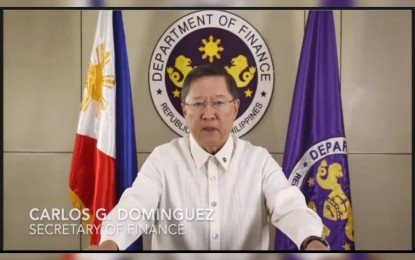
Finance Secretary Carlos Dominguez III (File photo)
MANILA – Protecting the government’s financial health provides it flexibility to make decisions regarding pandemic-related developments, Finance Secretary Carlos Dominguez III said.
In a Viber message to journalists on Wednesday, Dominguez recalled his observations in 2020 “that this contagion would most likely not disappear quickly and that sometimes we may have to take a step backwards after taking two forward (steps), to protect our gains achieved in combating the virus.”
“I believe the new variant has forced us to do exactly that,” he said.
The government has taken steps to ensure that while it protects the vulnerable sector from the pandemic through subsidies, the government’s fiscal health would remain stable.
Some sectors have questioned the government, saying that it is not providing enough financial aid to the affected sectors.
However, economic managers have repeatedly said that a balance between the need to provide stimulus and ensure that government finances remain sustainable is important.
Budget allocated for pandemic-related expenses, included in the Bayanihan to Heal as One Act, and the Bayanihan to Recover as One Act, amounts to around PHP450 billion.
These funds are the source for the PHP5,000 to PHP8,000 cash aid distributed to around 80 percent of the population affected by the enhanced community quarantine (ECQ) both in 2020 and this year, as well as the hiring of additional medical workers and equipment.
Economic managers have also continued the reopening of the economy to revive economic activities and ensure recovery despite the calls of some sectors against it.
The domestic economy contracted by 9.5 percent last year amid the pandemic, but economic managers are hopeful for the recovery of between 6 percent to 7 percent this year.
With the local transmission of the Delta variant, which experts said is more contagious than the earlier variants, some medical experts and the business sectors have called for the implementation of stricter quarantine measures by August to thwart further increases in local infections.
Asked if reverting to lockdowns would be the “new normal”, Dominguez said he “cannot predict the future with any accuracy.”
“But we can prepare ourselves for any eventuality by protecting our financing capacity to react appropriately to developments,” he said.
Socioeconomic Planning Secretary Karl Kendrick Chua said while the risks from the Delta variant are higher, the government’s response would remain to be managing it “by ensuring much faster vaccination rate, and limiting more stringent lockdown in local areas or sectors of highest risk, while allowing the rest of the people, especially those already vaccinated, to earn a living.”
“Our experience last March-April, where we were able to do a better balance can guide our response,” he said in a Viber message to journalists.
On the type of quarantine, he said both economic and health sides will need to see the full analysis before making a recommendation.
Asked about the impact on economic growth, Chua said he rather would wait until August 10 release of second-quarter gross domestic product data before revisiting the targets in light of recent developments. (PNA)
